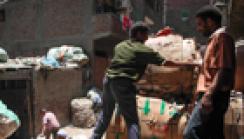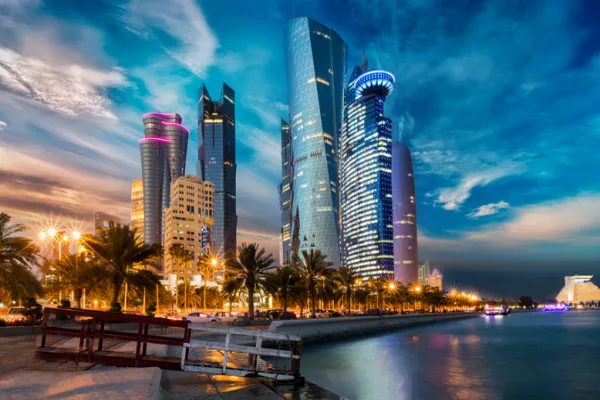The hilltop slum of Zabbaleen, perched on the outskirts of Cairo, offers sweeping views of the Egyptian city, but most of its residents are too busy to notice. Like ants in a colony, they scurry through unpaved, serpentine streets in a prolific collective enterprise to recycle tons of plastic trash. Every day an endless procession of trucks and bullock carts arrives laden with massive bags of garbage. Laborers, many of them barefoot children, haul the bags away to collection bins. Winches — some powered, some hand-cranked — whisk the trash to the roofs of apartment buildings, home to countless microsmelters. There the plastic is sorted by product type, then steeped for hours in tubs of hot water and caustic soda. Once cleaned, the plastic is shredded, melted down, rolled into long slender rods and cut into pellets the size and shape of breath mints: raw materials to be turned into a new generation of CD cases, marking pens and water bottles.
| Slideshow: Scenes from Cairo Egypt’s Coptic Christians struggle to thrive in a nation in turmoil. |

null
|
Business is bad, says Romani, who looks older than his 38 years. Since February 2011, when dictator Hosni Mubarak was deposed by a popular rebellion, Egypt’s economy has lurched to a halt. “We’d like to export to Asia,” he shouts over the din of a generator, “but the government discourages us with high tariffs so there’ll be adequate supply for local producers.”
Romani says the smelter is owned by six families, each of which may earn as much as $8,000 a year, or four times Egypt’s per capita income. Like most residents of Zabbaleen, they are members of the country’s ancient Coptic Christian community. On the building’s weathered stone walls are a rendering of the Madonna cradling her child, a poster of late Coptic pope Shenouda III and a carved assurance that Coptic industry “can make anything with the power of Christ.”
They are expressions of faith by a caste of minority entrepreneurs that, since Mubarak’s ouster and the election last year of Egypt’s Islamist-dominated government, is being challenged like never before. Incidents of fierce sectarian violence are fueling what appears to be a Coptic exodus, depriving the country’s economy of a vital source of entrepreneurial skill.
According to Basant Mousa, who runs Copts United, a Cairo-based news service that focuses on Christian issues, waste management companies owned by members of Egypt’s Muslim Brotherhood are leveraging their political connections to horn in on Zabbaleen’s franchise. “The Islamists are the new businessmen,” Mousa says. “The Copts are leaving, and they think they can just fill the void.”
The Egyptian army removed the Copts’ immediate concern on July 3 when it toppled the Islamist government of President Mohamed Morsi, a former Brotherhood member, and installed an interim regime headed by Adly Mansour, head of the country’s Supreme Constitutional Court. But it was unclear whether the move would restore stability in Egypt or hasten the country’s descent into economic and political chaos. The potential for sectarian violence remained high, with several dozen people reported killed in clashes in the days immediately before and after Morsi’s ouster.
Statistics vary, but Christians are estimated to account for between 5 and 10 percent of Egypt’s 85 million population, which is overwhelmingly Sunni Muslim. The Copts constitute one of the oldest Christian sects, and they are noteworthy for their deep assimilation. Cairo has no Coptic quarter, the capital’s leaders remark proudly, and Christians are well represented across the commercial spectrum, from the smelter slums of Zabbaleen to the Orascom group of companies, the global telecommunications, construction and hotel empire owned by the Sawiris family.
For centuries Egypt’s Christian population was just one element in a largely peaceful and prosperous cauldron of religions and ethnicities centered in Cairo and Alexandria. Since the creation of Israel six decades ago and the cycles of war and sectarian unrest that followed, however, Egypt has steadily shed much of its non-Muslim communities, including its Sephardic Jewish population and a large European diaspora of Greeks, Armenians, Italians and others. In the mid-1950s, Egyptian strongman and Arab nationalist Gamal Abdel Nasser expelled Jews and foreigners and in many cases seized their businesses for the state. Only the Copts remain in significant numbers, but before the army’s intervention, anecdotal evidence suggested that they too were abandoning the country in response to what they regarded as an aggrandizing and intolerant Islamist movement.
Although few activists accused the Morsi government of encouraging the harassment of Copts, they complained that he had not been aggressive enough in combating discrimination. The few Christians appointed to high-profile positions in the Morsi government were mere tokens, Coptic leaders contend. George Ishak, a Christian politician, last year served on a human rights panel that produced a report calling on the new president to “redeem the revolution’s promise of social equity.” The report was hand-delivered to Morsi’s office — and ignored, Ishak says. In March neither Morsi nor his prime minister, Hisham Qandil, attended the first Easter mass celebrated by new Coptic leader Pope Tawadros II. Instead, the president sent the Housing minister, a move that many Copts saw as a snub.
“The Copts are being interfered with in their work,” says Mina Gamal, spokesman for a Cairo-based Christian youth movement. “Some fear the Muslim Brotherhood will strip them of their positions. We are worried about the future. So long as Copts are in Egypt, these problems will continue for a long time.”
***
The Economic Crisis that weighs on Egypt does not discriminate on the basis of religion or ethnicity. Muslims as well as Christians are said to be squirreling away money abroad and mulling relocation. Since Mubarak’s departure the economy has grown at a miserly rate of 2 percent, about one third of the pace needed to absorb new entrants into the job market. Foreign investment has evaporated, and the tourism industry is struggling. The Egyptian pound has lost more than 13 percent of its value against the dollar, and the country’s foreign reserves have dwindled to a ten-year low of $13.4 billion, down from the prerevolution level of $36 billion, forcing the central bank to ration hard-currency loans and fostering brisk demand for black-market dollars. Some analysts say the government is so desperate for revenue that it has threatened to use arbitrary audits to impose stiff tax assessments on companies.
The Brotherhood-dominated Morsi government, which was inaugurated last June, appeared to be more interested in settling political scores than in reaching out to qualified technocrats for sound economic advice. Negotiations on a $4.8 billion loan from the International Monetary Fund are now in their second year and look to be going nowhere. At the same time, Morsi, in arrogating to himself unprecedented executive power, particularly in judicial appointments and the drafting of a new constitution, did little to inspire investors and business owners. So unpopular had Morsi become with ordinary Egyptians that a growing number were hoping for a military coup before the army intervened. “This is an ongoing revolution,” says Angus Blair, a consultant and president of the Signet Institute, a Cairo think tank. “I’m telling investors to remain on the sidelines. We haven’t seen the bottom yet.”
Like other Arab dictators with their Islamists, Mubarak generally kept sectarian strife in check as a means of guaranteeing the loyalty of minority communities while he engaged in a long-term struggle to contain the Ikhwan, as the Muslim Brotherhood is known in Arabic. Since Mubarak’s overthrow religious violence has flared dramatically. In October 2011, for example, following the burning of a Coptic church in Upper Egypt, 28 people, mostly Christians, were killed in clashes with security forces. In April of this year, armed gangs laid siege to the Coptic cathedral in Cairo’s Abbasiya district, the church’s seat, killing two men inside the compound and injuring dozens more. The prolonged assault — video footage of which shows riot police standing idly by — followed a mass funeral for five Copts killed during sectarian clashes two days earlier in El Khusus, in northern Egypt. A Muslim man also died in the fighting, which occurred after an Islamic institute was vandalized.
Despite expressions of regret from the Morsi government immediately after the siege lifted, the Coptic leader, Pope Tawadros II, accused the president of “delinquency” and “misjudgments.” Making matters worse, Essam al-Haddad, Morsi’s assistant for foreign affairs, suggested on Facebook that Christians had provoked the assault. The fact that he did so in English was unprecedented in its impropriety, according to Mounir Fakhry Abdel Nour, a prominent Coptic businessman, politician and former government minister. “Issuing a statement in English is sending a signal to the U.S. and the West, which is inexcusable in itself,” says Abdel Nour. “These kinds of sectarian problems were always internal matters and dealt with as such. To accuse the Copts before an investigation is held is irresponsible and behavior characteristic of a power not fit for office.”
The crises in April and the government’s ham-fisted response, many Copts say, accelerated the steady drumbeat of Christian emigration. Wasif Amin Wassef, a Coptic jeweler, says he is buying three times the amount of gold he did just two years ago as Christians sell precious family heirlooms to help pay for their departure. “Every week I learn of a dozen people who are leaving for Georgia,” Wassef says, referring to the Central Asian republic, which is issuing passports to anyone willing to invest up to $20,000 there. A bank executive in Cairo estimates that thousands of Copts have obtained U.S. passports over the past 18 months or are using other foreign passports to leave Egypt. “Three of my cousins have left already,” she says. According to a spokesman for the U.S. Department of Homeland Security, Washington has granted 4,121 requests for asylum from Egypt since Mubarak’s overthrow, more than ten times the number accepted the year before the revolution. The figures are not broken down by sectarian or ethnic identity, as these are not factored into the review process, the spokesman emphasizes.
Even the powerful and internationally prominent Sawiris clan appears to be hedging its bets. In March the eldest of the four brothers who run the Orascom group declared from London, where he was traveling, that he had been forced to leave Egypt because his family was being “deliberately attacked” by the Morsi administration. Naguib Sawiris, an early and active supporter of the revolution and a critic of the Brotherhood’s mixing of religion and politics, told state-owned newspaper Al-Ahram that the government was “distorting the legal system in Egypt” at his family’s expense. He likened Egypt under the Ikhwan to Italy under Mussolini.
Earlier this year the government imposed a travel ban on Onsi Sawiris, the family patriarch, and Naguib’s younger brother Nassef for allegedly failing to pay taxes on the profit realized from the 2007 sale of a cement unit by Orascom Construction Industries, the group’s flagship company, to a French concern. The charge perplexed analysts, who pointed out that Egypt has no capital gains tax and that Orascom Construction took the cement company public two months before its sale precisely to leverage tax incentives offered to promote public listings.
In April the company agreed to pay 7 billion Egyptian pounds ($1 billion) to Cairo’s tax authority, prompting the removal of the travel restrictions on Nassef and his father, both of whom were abroad when the ban was announced. (In May, Naguib and his father returned to Egypt and were welcomed with flowers at Cairo’s airport by a Morsi envoy.) The construction giant is preparing a share swap with its Dutch unit, OCI, that would effectively shift trading in its stock to Amsterdam. The departure of Orascom Construction’s shares, which account for about 30 percent of the Egyptian stock market’s total capitalization, would be felt heavily in Cairo at a time when trading volume has been languishing.
Naguib Sawiris, meanwhile, has liquidated most of his assets in Egypt. In October 2010 he signed a $6.5 billion deal that merged Orascom Telecom Holding, which he launched in the late 1990s, into Russian-owned and Amsterdam-based telecommunications company VimpelCom. He retains some minor Egyptian equity stakes via a holding company that was created as part of the merger with VimpelCom, but analysts say he is eager to exploit investment opportunities in the U.S.’s emerging shale gas industry. (Sawiris declined requests for an interview for this article.)
Before his brief exile Naguib swore that the Sawiris family would never abandon Egypt. Credibly, Orascom officials say the relisting of OCI shares in Europe is a natural next step in the company’s expanding global presence. But the specter of what appears to be an official shakedown of the world’s largest and most respected Coptic business group has done as much to chill investors’ faith in the Morsi administration as did the sectarian killings at El Khusus and Abbasiya. Though the Sawiris family members are generous benefactors to their co-religionists, analysts point out, their enterprises are also important sources of employment for Muslims. “We have local clients with a lot of money and who want to spend it, but they’re sidelined because they have no confidence in this leadership,” says Hany Genena, head of research at Cairo-based Pharos Securities Brokerage.
***
Beshay Steel, One of the oldest coordinates in Egypt’s constellation of Coptic enterprises, is similarly buffeted by the country’s rocky political transition. According to Rafik Beshay, the youngest of four brothers who have been managing the company since their father’s death in 2011, before the revolution the company employed roughly as many Christians as it did Muslims. Over the past two years, however, that ratio has shifted decisively in favor of the latter.
“We’ve tried to keep an even mix,” says the 28-year-old Beshay, who works as the company’s procurement director and spoke to Institutional Investor before the army ousted Morsi. “But the Christians are leaving, and that turnover effects us.”
Rafik’s grandfather established Beshay Steel in the late 1940s as a trading company that matched buyers and sellers of ferrous metals. In the early 1970s the company went upstream, buying a small rolling mill from Bethlehem Steel Corp. in Pennsylvania and rebuilding it in Egypt. Today, Beshay Steel sells $350 million worth of steel reinforcement bar and wire rods annually. It exports one third of its output.
In 2008 the company received a license from the government to build a more sophisticated mill capable of producing higher-margin products. Construction was suspended during the revolution because of frequent electrical blackouts and manpower shortages as nervous employees refused to travel to work. After Mubarak resigned and was replaced by a military-led government, Beshay Steel’s license was revoked. Though the reasons are obscure, Rafik Beshay blames overzealous investigators building a case against Ahmed Ezz, a well-connected investor and Mubarak ally who in March was sentenced to 34 years in prison for running various fraud schemes, at least one of which involved an equity stake in a state-owned steel company.
“We had nothing to do with Ezz professionally except as competitors,” Beshay says. “But we’re a strategic company, so we’re always under the microscope.”
The license was reinstated, but only after the Beshay brothers worked the Ministry of Industry and Foreign Trade at the highest levels. Construction on the new mill has resumed, but the completion date is uncertain. According to Rafik Beshay, the company’s budget planners are factoring in the prospect of another round of social unrest, which could once again sap man-hours and increase insurance premiums. With the peak summer months approaching, additional power cuts are likely. ( The Morsi government rationed energy supplies for residential areas, according to analysts, to avoid blackouts close to parliamentary elections scheduled for the fall.) An importer of raw materials, Beshay Steel is saddled by the weak pound, as well as by higher wages and the cost of enhanced working conditions, consequences of the postrevolution revival of organized labor.
Nonetheless, Rafik Beshay is optimistic about the future. As Egypt’s political order matures, he says, the government will have to address the country’s badly neglected infrastructure, and steelmakers will benefit hugely as a result. “The beauty of Egypt is its large market and domestic demand,” he says. “Once the situation stabilizes the economy can grow on its own. All we need is a pharaoh. It was a strong hand that built the pyramids and the Suez Canal, and that’s what we need today. Egyptians need a pharaoh.”
If time is the ally of Beshay Steel, it is the enemy of Adel El Abd, chairman of Smart Systems, a producer of home security networks, and three other companies that before the revolution generated combined revenues of about £ E30 million annually.
El Abd’s flagship company produces collapsible tubes for cosmetics and pharmaceuticals firms. It was launched by his father and uncle in the early 1980s, which was a good time to start a business in Egypt. Then-president Anwar Sadat was deregulating the economy after a generation of Nasser’s disastrous command economics. That turned out to be a brief renaissance, however. Sadat was assassinated in 1981, and his successor, Mubarak, was more interested in consolidating his authority than in modernizing the economy. Growth stagnated until 2004, when a new government of technocrats removed import duties and cut corporate and income taxes to promote domestic consumption. Almost overnight the price of imported aluminum, which El Abd needs to make his tubes, declined sharply and demand soared. The economy revived, averaging about 5 percent growth in the seven years before Mubarak’s removal.
The Tahrir Revolution, named after the square in downtown Cairo that hosted the largely peaceful insurgents, was a defining moment in the so-called Arab Spring of antiautocratic rebellions. For El Abd, though, there was nothing redemptive about the three-week revolt. It was, he says, “a disaster, a catastrophe.” Nor does he believe the revolution was the spontaneous popular movement it was reported to be. “The Muslim Brotherhood planned it long ago,” he says. “They sent kids to Norway or Sweden to learn how to overthrow a government.” (El Abd is referring to the April 6 Youth Movement, a secular dissident Egyptian group formed several years before the revolution that learned tactics of nonviolent resistance in Europe from groups of ex-dissidents.)
However hotly Egyptians debate the origins of Mubarak’s removal — media producer Mousa contends that the Arab Spring was planned by the U.S. government “to get the Islamists to recognize Israel” — there is little disagreement about its aftermath. Not only is growth flat, but one quarter of the working-age population is estimated to be jobless, and inflation is rising ominously as demand for basic commodities exceeds supply. That includes hard currency. In late December the government announced it would auction £ E75 billion worth of U.S. dollars three times a week to companies that need foreign exchange to import raw materials. Since then that allotment has declined to £E40 billion, and business owners who are allowed to participate in the auction — informal guidelines place importers of food and other strategic commodities above nonessentials — complain it is not enough to sustain their businesses.
“The banks are finished, and they’re telling us to go to the black market,” says El Abd, who hasn’t exchanged pounds for dollars at the official rate since February. “The problem with the black market is, you can’t find all the money you need in one place. So you go from one dealer to another, and the more they have, the higher the rate. You can’t plan a business like this.”
To survive, El Abd has laid off some of his 220 factory workers and cut back on expenditures like cleaning agents. In addition to the enfeebled pound, he struggles with rising energy costs and wage rates. Because he cannot raise prices to offset higher operating costs — the reforms introduced since the Sadat era attracted a wave of foreign companies that now compete directly with Egyptian ones — his profit margins have diminished by more than half from their prerevolution level of 30 percent. Local buyers owe him millions of pounds, and the payments he does receive are usually delinquent by four to six months. Orders have declined by 60 percent. Earlier this year, for example, GlaxoSmithKline cut the size of a 2010 order for tubes from 19 million to 9 million.
El Abd has a friend who is preparing to move his electrical switches factory to Georgia, but the Smart Systems chairman is not prepared to leave just yet. He considered relocating his tube factory to Eastern Europe but abandoned the idea after concluding that the competition was too stiff. Another alternative is to sell his companies and invest in real estate in Europe or the U.S. “The only problem is, there is no interest” in his companies, he says. “There’s not enough fuel, labor is crazy with its demands for higher salaries, and you can’t buy raw materials because there’s no liquidity.”
El Abd, who spoke to II before the army removed Morsi from power, concedes that the burdens of postrevolutionary Egypt have been assumed by Muslim businessmen as well, but he says only the Copts are exposed to the kind of intimidation that might compel them to go the way of the country’s other minority groups. “We feel the pressure directly,” he says. “When we go to church for holiday feasts, we need security arrangements and everyone is checked. Indirectly, there are stories of companies like Orascom being unfairly coerced to pay taxes. ”
What the state did to Jewish and foreign enterprises during the Nasser era, El Abd says, may now be happening to his own sect. He is no stranger to the pain and anxiety of forced migration: For years he and his family flourished in Sudan, where his grandfather, a native of Upper Egypt, worked as a garment trader. They lived in Khartoum until 1978, when Islamists overthrew the government and imposed shari’a law. When armed thugs began house-to-house searches for liquor, the El Abds hastily returned to Egypt. Later they learned of friends who were jailed and killed.
Today, says El Abd, Coptic priests cannot obtain permission to renovate their churches. It is part of a relentless squeeze on an ancient Christian community that he believes will end in violence. “I expect trouble and killing,” he says. “Then the army will intervene.” ••






